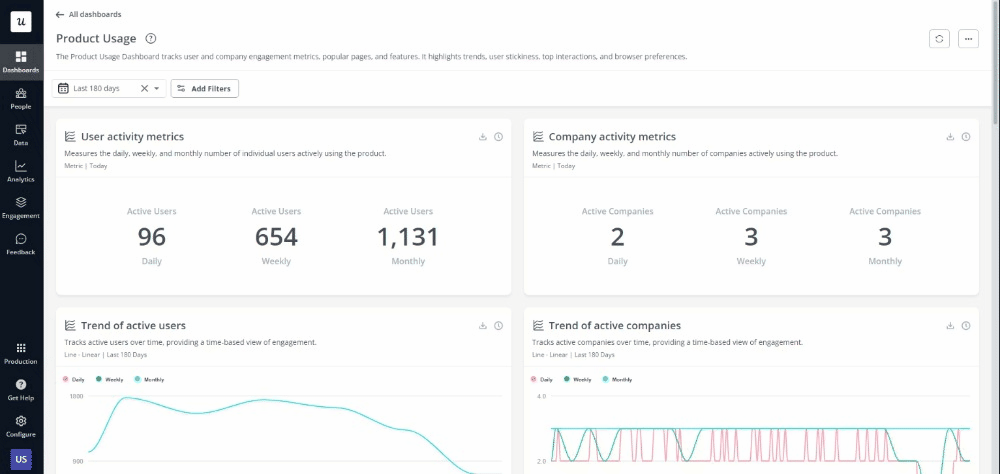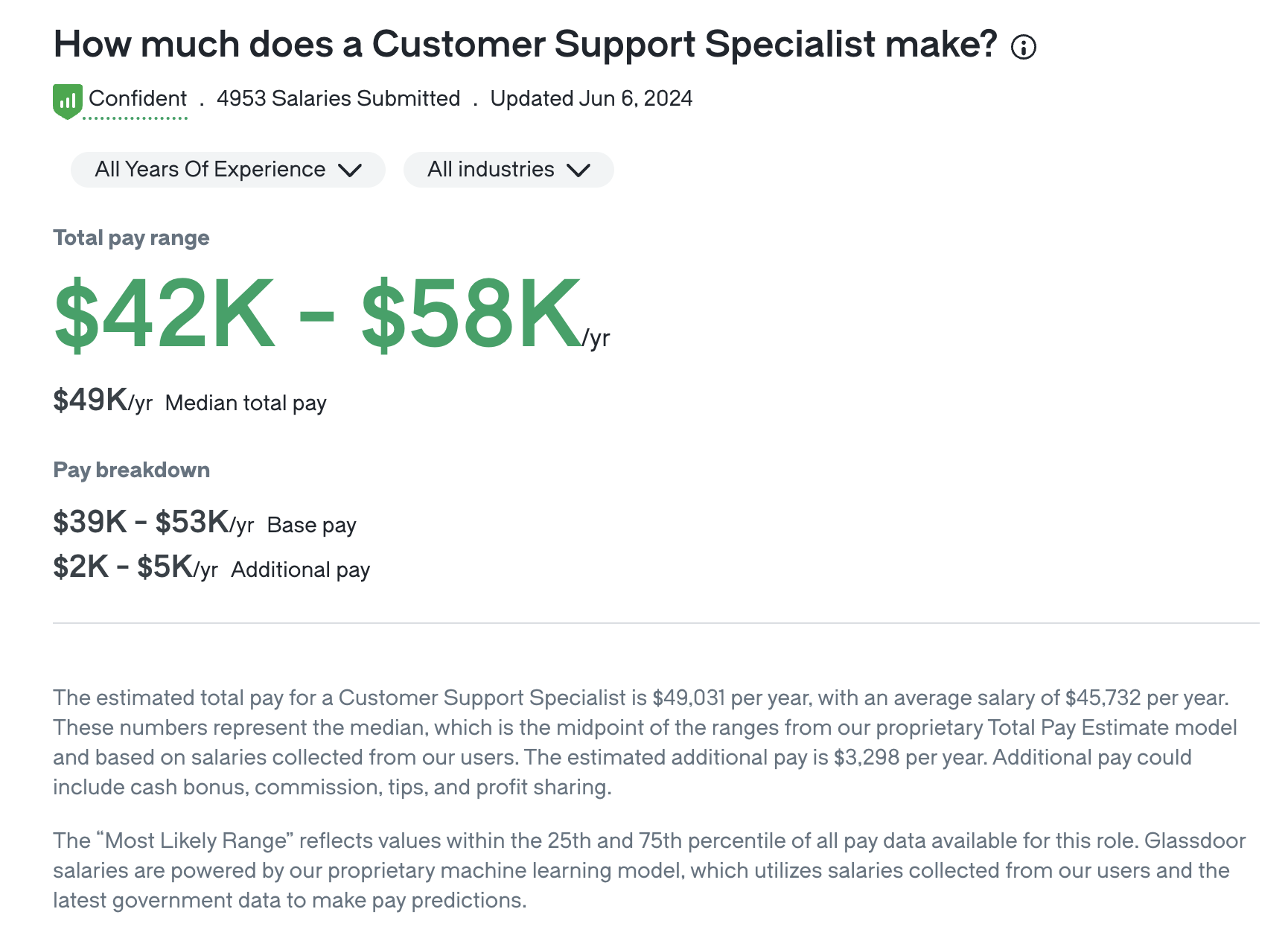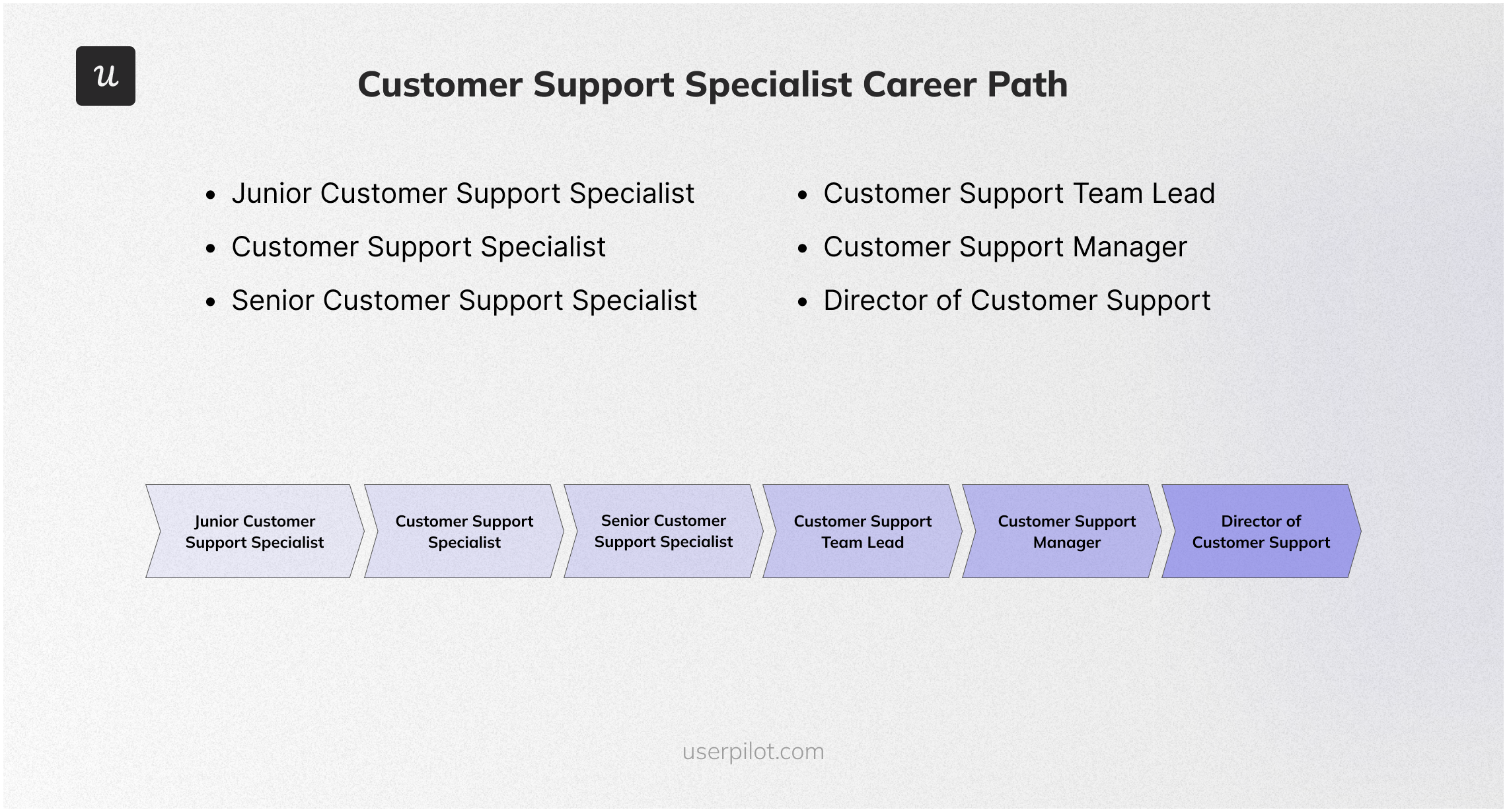![Customer Support Specialist Salary [+ Resources to Advance]](https://blog-static.userpilot.com/blog/wp-content/uploads/2024/08/Customer-Support-Specialist-Salary-1-450x295.png)
Understanding the salary range for customer support specialists is crucial whether you’re entering the field or looking to advance your career.
In this guide, we’ll provide an overview of typical customer support specialist salaries, explore factors that can influence earnings, and share valuable resources to help you progress in your career.
Let’s get started!
Try Userpilot Now
See Why 1,000+ Teams Choose Userpilot

TL;DR
- A customer support specialist is a professional responsible for assisting customers with inquiries, troubleshooting issues, and providing solutions to user problems.
- One of the biggest factors influencing your salary is your experience level. Here’s how experience can impact your Customer Support Specialist salary, according to Glassdoor:
- 2 to 4 years (Customer Support Specialist): $49,031 per year
- 5 to 7 years (Senior Customer Support Specialist): $58,000 per year
- 8+ years (Principal Customer Support Specialist): $67,000 per year
- There is always a place to improve and upskill in your position as a customer support specialist. Here are some tips to get started with:
- Listen Actively: Pay close attention to customer concerns without interrupting. This helps you understand their issues better and shows that you value their input.
- Communicate Clearly: Use simple and concise language to explain solutions. Avoid jargon and ensure customers fully understand your instructions.
- Show Empathy: Demonstrate understanding and compassion towards customer issues. Empathy helps build rapport and trust, making customers feel valued.
- Master Product Knowledge: Stay updated on all aspects of your product. Comprehensive knowledge enables you to provide accurate and efficient support.
- Be Proactive: Anticipate potential issues and provide solutions before customers encounter problems. Proactive support can prevent frustration and enhance customer satisfaction.
- Keep Learning: Regularly update your skills and knowledge. Continuous learning helps you stay effective and adapt to new challenges.
- Maintain a Positive Attitude: Stay positive and friendly, even in difficult situations. A positive attitude can defuse tension and create a pleasant experience for the customer.
- Looking into tools for customer support specialists? Userpilot is an all-in-one product platform with engagement features and powerful analytics capabilities. Book a demo to see it in action!
What is a customer support specialist?
A customer support specialist is a professional responsible for assisting customers with inquiries, troubleshooting issues, and providing solutions to user problems.
Their primary goal is to ensure customer satisfaction by delivering timely and effective support.
Customer support specialist’s main responsibilities
A customer support specialist’s responsibilities encompass a wide range of tasks aimed at fostering positive customer relationships. Here are the main duties of a customer support specialist:
- Respond to Customer Inquiries: Handle customer queries through various channels such as phone, email, chat, and social media, ensuring timely and effective responses.
- Troubleshoot Technical Issues: Diagnose and resolve technical problems related to the SaaS product, guiding customers through solutions and ensuring minimal disruption to their operations.
- Provide Product Training: Conduct training sessions and webinars to help customers make the most of the software functionalities.
- Assist with Onboarding: Guide new clients through the onboarding process, ensuring they are fully integrated and comfortable with the SaaS product.
- Monitor Support Metrics: Tracking key performance indicators (KPIs) such as response times, resolution rates, and customer satisfaction scores to ensure service quality.
- Maintain Customer Records: Keep detailed records of customer interactions, issues, and resolutions in the CRM system, ensuring comprehensive documentation.
- Gather and Share Customer Feedback: Collect feedback from customers and share insights with the product and development teams to drive continuous improvement and product enhancements.
- Create Support Documentation: Develop and update support materials such as FAQs, user guides, and troubleshooting documents to assist customers in finding solutions independently.
- Manage Customer Accounts: Assisting customers with account-related tasks, such as updating information, managing subscriptions, and resolving billing issues.
- Collaborate with Internal Teams: Work closely with sales, product development, and marketing teams to relay customer feedback, identify opportunities for upsells and cross-sells.
How much does a customer support specialist make?
One of the biggest factors influencing your salary is your experience level. Here’s how experience can impact your Customer Support Specialist salary, according to Glassdoor:
- 2 to 4 years (Customer Support Specialist): $49,031 per year
- 5 to 7 years (Senior Customer Support Specialist): $58,000 per year
- 8+ years (Principal Customer Support Specialist): $67,000 per year
Industries where the demand for customer support professionals is highest tend to be the same industries that pay the most on average. These include technology, healthcare, finance, retail, and manufacturing. Here are salaries, as reported by Glassdoor:
- Healthcare Customer Support Specialist: $47,000 per year
- Finance Customer Support Specialist: $52,000 per year
- Retail Customer Support Specialist: $44,000 per year
- Technology Customer Support Specialist: $55,000 per year
Where you live can have a big impact on how much you make as a Customer Support Specialist. As more and more companies employ a geographically dispersed workforce (including remote workers), it’s common for companies to offer location-based salaries. According to Glassdoor, these are the midpoint salaries for Customer Support Specialists in the following large US cities:
- San Francisco: $95,071 per year
- New York: $80,187 per year
- Boston: $77,931 per year
- Washington, DC: $78,323 per year
- Chicago: $76,022 per year
Customer support specialist career path
The career path for customer support specialists isn’t always linear, although if you excel at your job responsibilities and have a growth-oriented mindset, you should be able to advance. Here is what your career could look like and how to achieve it:
- Junior Customer Support Specialist: Starting in this role involves responding to customer inquiries via phone, email, and chat, troubleshooting basic issues, documenting interactions, and escalating complex problems. Progress by gaining experience, improving problem-solving skills, and taking relevant training or certifications.
- Customer Support Specialist: Responsibilities include handling complex issues, conducting training sessions, collecting and analyzing customer feedback, and mentoring junior staff. Progress by gaining advanced certifications, developing leadership skills, and demonstrating success in problem resolution.
- Senior Customer Support Specialist: Duties encompass resolving complex issues, leading training initiatives, analyzing support metrics, and mentoring the team. Progress by gaining experience in leadership, strategic planning, and managing projects successfully.
- Customer Support Team Lead: This role involves managing a support team, developing support strategies, handling escalations, and monitoring support metrics. Progress by managing larger teams and projects, developing strategic planning skills, and demonstrating success in team performance.
- Customer Support Manager: Oversee the entire support department, develop goals and procedures, coordinate with other teams, and manage the department budget. Progress by gaining upper management experience, pursuing advanced education in business management, and leading a successful support department.
- Director of Customer Support: Set strategic direction, lead cross-functional initiatives, develop long-term plans, and report to senior executives. Progress by gaining executive leadership experience, pursuing further education, and demonstrating success in large-scale support initiatives.
Best practices to be a great customer support specialist
There is always a place to improve and upskill in your position as a customer support specialist. Here are some tips to get started with:
- Listen Actively: Pay close attention to customer concerns without interrupting. This helps you understand their issues better and shows that you value their input.
- Communicate Clearly: Use simple and concise language to explain solutions. Avoid jargon and ensure customers fully understand your instructions.
- Show Empathy: Demonstrate understanding and compassion towards customer issues. Empathy helps build rapport and trust, making customers feel valued.
- Master Product Knowledge: Stay updated on all aspects of your product. Comprehensive knowledge enables you to provide accurate and efficient support.
- Be Proactive: Anticipate potential issues and provide solutions before customers encounter problems. Proactive support can prevent frustration and enhance customer satisfaction.
- Keep Learning: Regularly update your skills and knowledge. Continuous learning helps you stay effective and adapt to new challenges.
- Maintain a Positive Attitude: Stay positive and friendly, even in difficult situations. A positive attitude can defuse tension and create a pleasant experience for the customer.
Best resources for customer support specialists
From books to webinars, there are different resources out there for customer support specialists.
By identifying the right ones and familiarizing yourself with them, you can improve your skills.
Best books for customer support specialists
Books are a great way to learn new skills and stay informed on industry trends as a customer support specialist. Here are some of our favorite books you need to check out:
- “The Effortless Experience: Conquering the New Battleground for Customer Loyalty” by Matthew Dixon, Nick Toman, and Rick DeLisi: This book emphasizes the importance of reducing customer effort to enhance loyalty.
- “Hug Your Haters: How to Embrace Complaints and Keep Your Customers” by Jay Baer: This book teaches customer support specialists how to handle complaints effectively and turn unhappy customers into loyal advocates. It highlights the importance of addressing negative feedback promptly and professionally.
- “Delivering Happiness: A Path to Profits, Passion, and Purpose” by Tony Hsieh: Written by the CEO of Zappos, this book explores how focusing on company culture and customer happiness can lead to business success. It offers valuable lessons on creating a customer-centric organization.
- “The Customer Service Survival Kit: What to Say to Defuse Even the Worst Customer Situations” by Richard S. Gallagher: This practical guide provides specific phrases and techniques for handling difficult customer interactions. It’s an essential resource for maintaining composure and resolving conflicts.
- “The Thank You Economy” by Gary Vaynerchuk: Emphasizes the power of caring about your customers and how genuine engagement can drive business success in the social media age.
Best webinars for customer support specialists
Webinars are another way customer support specialists can get exposure to new industry trends or best practices.
Here is our list of webinars that we believe will benefit every customer support manager:
- Userpilot’s “Enhancing User Onboarding and Engagement”: This webinar focuses on creating effective onboarding processes and engaging users throughout their journey. It covers strategies for using in-app experiences to reduce churn and drive retention.
- “Customer Success Strategies for SaaS” by ClientSuccess: Focused on SaaS companies, this webinar offers strategies for ensuring customer success, reducing churn, and driving growth through proactive support and relationship management.
- “Effective Communication Skills for Support Teams” by Intercom: This webinar provides actionable tips and techniques for engaging with customers empathetically.
- “Building Effective Knowledge Bases” by Help Scout: This webinar provides guidance on creating and maintaining knowledge bases that empower customers to find solutions independently, reducing the burden on support teams.
- “Social Media Support: Best Practices” by Hootsuite: Explore best practices for providing customer support through social media channels, including how to manage complaints, engage with customers, and measure success.
Best blogs for customer support specialists
Blogs are probably the fastest and easiest way to upskill as a customer support specialist.
Here are some of the best blogs that will give you a wealth of knowledge on customer support topics:
- Userpilot Blog: The Userpilot Blog offers in-depth articles on user onboarding, customer success, and product adoption. It provides valuable insights and practical tips for customer support specialists looking to enhance user experiences and reduce churn.
- Help Scout Blog: The Help Scout Blog focuses on customer service, support, and experience. It provides actionable tips, case studies, and expert advice to help support teams deliver outstanding service.
- Kayako Blog: Kayako’s blog provides articles on customer support, service desk management, and customer experience. It offers insights on building strong customer relationships and enhancing support operations.
- ChurnZero Blog: The ChurnZero Blog focuses on customer success and customer retention. It offers valuable content on reducing churn, improving customer engagement, and achieving customer success.
- CustomerThink Blog: CustomerThink features a wide range of articles on customer service, support, and experience. It includes insights from industry leaders and practical advice for improving customer support.
Best podcasts for customer support specialists
Podcasts offer valuable insights and practical advice for customer support specialists looking to enhance their skills and stay updated on industry trends.
Here are some of the best podcasts to check out:
- “Call Center Helper – The Contact Centre Podcast”: This podcast covers a wide range of customer support topics, including best practices, technology trends, and expert insights on improving call center operations.
- “Customer Support Leaders”: Hosted by Charlotte Ward, this podcast features interviews with industry leaders discussing their experiences, challenges, and strategies for delivering top-notch customer support.
- “Support Ops Hangouts”: Join the Support Ops team as they discuss customer support tools, trends, and tips. The podcast offers valuable insights for improving support operations and enhancing customer experiences.
- “Crack the Customer Code”: Hosted by Jeannie Walters and Adam Toporek, this podcast explores the intricacies of customer experience and support, offering actionable insights and expert interviews.
- “The Modern Customer Podcast”: Hosted by Blake Morgan, this podcast delves into modern customer service and experience strategies, featuring conversations with leaders in the industry.
Best tools for customer support specialists
Investing in the right technology is critical to the customer support specialist’s job. Here are some tools that every customer support specialist should have under their belt:
- Best tool for user onboarding and product adoption – Userpilot: A powerful tool for creating personalized in-app experiences and helping users adopt new features. Additionally, with Userpilot, you can create help centers for self-service, reducing the need for customer support.
- Best tool for project management – Monday: A versatile project management tool that helps customer support teams organize tasks, track progress, and collaborate effectively.
- Best tool for customer service management – Zendesk: A comprehensive CX tool that helps manage customer inquiries and track tickets.
- Best tool for customer relationship management – HubSpot Service: An all-in-one CRM and service platform that integrates customer data, manages support tickets, and helps automate service workflows.
- Best tool for omnichannel support – Freshdesk: An intuitive CX tool that provides a unified customer support platform, allowing teams to manage customer interactions across multiple channels.
- Best tool for customer success management – ClientSuccess: A customer success tool that helps manage customer relationships, track satisfaction, and ensure customer success through proactive support.
- Best tool for customer feedback – Churnzero: This tool helps gather and analyze customer feedback, providing insights into customer health and helping prevent churn.
- Best tool for team collaboration – Confluence: A collaborative workspace that enables customer support teams to share knowledge, document processes, and work together efficiently.
- Best tool for UX design – Figma: A UX/UI design tool that allows support teams to collaborate on design issues and provide feedback to the product team, ensuring a better user experience.
- Best tool for data analytics – Tableau: A powerful data analytics tool that helps support teams visualize customer data, track performance metrics, and make data-driven decisions.
Using these tools, customer support specialists can improve their efficiency, streamline workflows, and provide exceptional service to customers.
Conclusion
Now that you have a better understanding of the salary range for a customer support specialist position, you can take steps to improve your earning potential.
Consider pursuing relevant certifications, developing your skillset, or negotiating effectively during the job offer stage.
Looking into tools for customer support specialists? Userpilot is an all-in-one product platform with engagement features and powerful analytics capabilities. Book a demo to see it in action!










